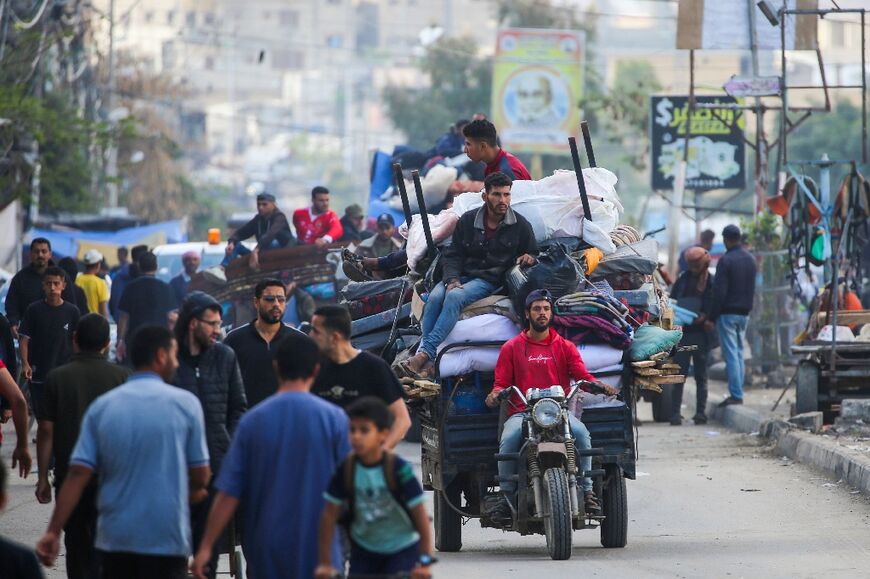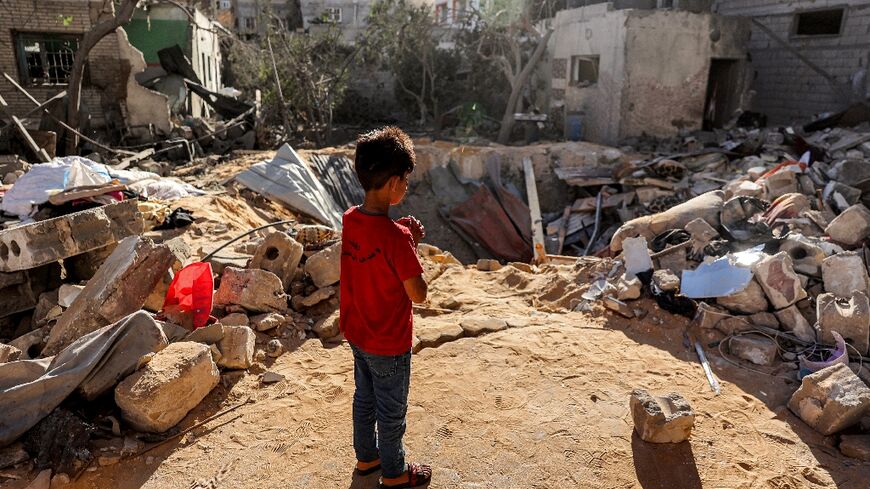Displaced Gazan Marwan al-Masri, sheltering in Rafah, said on Wednesday "life has completely ceased" since Israeli tanks and troops entered the city's east, sending desperate Palestinians fleeing north in the besieged territory.
More than 1.4 million people had crammed into Rafah, a city on the Gaza Strip's southern border with Egypt, as Israeli forces pushed their way southward from the coastal territory's north during months of war against Hamas militants.
Many in Rafah have been displaced multiple times during the seven-month war, and are now heading back north after Israeli forces called for the evacuation of the city's eastern past, which hosts tens of thousands of people.
"Life has completely ceased in the downtown area of Rafah", said 35-year-old Masri, who has been displaced from northern Gaza.
"The streets are empty of people, and markets are in a state of paralysis", he told AFP.
"We all feel fear of any advancement in the invasion, as happened in the eastern areas, which are now completely empty of residents".
Masri said he and his relatives "are all tense and frightened" by the incessant shelling that they feel is getting closer to them.
Ibtihal al-Arouqi, who was displaced from Al-Bureij refugee camp in central Gaza, said she has found herself once again homeless.
"We emerged from under the rubble of our house in Al-Bureij, and now due to intense shelling in Rafah, my children and I are in the street", she said.
The 39-year-old said that only two weeks ago she gave birth by Caesarean section.
"We don't know where to go. There is no safe place", Arouqi added.
She spoke from west Rafah, where many Palestinians remain.
While it is relatively calmer than the city's heavily bombarded east, the west has also been hit by shelling, an AFP journalist reported.
Both Arouqi and Masri said incessant shelling has filled the air with dust and smoke that make it hard to breathe.
"The situation in Rafah is chaotic," said Mohammed Abu Mughaiseeb, a medical coordinator for Doctors Without Borders (MSF) charity in Rafah.
Himself displaced from Gaza City, he described "people carrying their things, mattresses, blankets, kitchen items on trucks" to flee east Rafah.
But "there's no space anymore in the west of Rafah," Abu Mughaiseeb told AFP.
The city's Al-Najjar hospital was "closed, evacuated by the medical team to avoid what happened in Al-Shifa or Nasser", he added, referring to two other Gaza medical facilities raided by Israeli forces during the course of the war.
- 'No room' -

Caught between Israeli shelling from the east, an Egyptian border to the south and the Mediterranean to the west, many fleeing Rafah went north.
They headed towards the nearby city of Khan Yunis as well as Deir al-Balah in central Gaza, where thousands of tents filled up the coast.
Ahmed Fadel, 22, is one of many retracing his steps, returning to the northern parts of Gaza he had fled earlier on in the war.
Originally from Gaza City, he was first displaced to Nuseirat refugee camp in central Gaza, and then ordered to leave when Israeli troops entered the nearby Al-Bureij camp.
"We left and moved to Rafah but they pummelled and threatened the city, so we came to Deir al-Balah -- which is already crammed," he told AFP.
AFP journalists witnessed long lines of displaced Palestinians fleeing Rafah on cars, trucks, donkey-pulled carts, tuk-tuks or by foot, carrying what belongings they could.
AFP footage on Wednesday showed thousands of tents and shelters packed along Deir al-Balah's coastal area.
On the ground streets were packed with people unloading belongings or selling wares.
"Deir al-Balah is a small city", local merchant Abdelmajid al-Kurd told AFP.
"It's a very small town that is now extremely overcrowded", he said.
"There's no room or facilities to accommodate these people."


